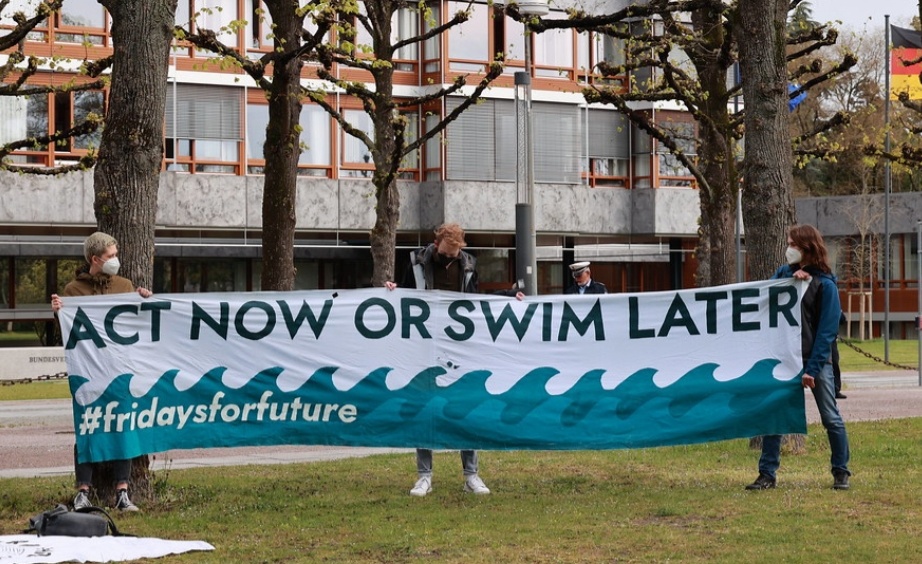
- Sustainable Planet -
- 4mins -
- 159 views
Top German court ruling says climate goals not tough enough
Judges in Germany order government to strengthen legislation before end of year and improve emissions targets from 2031 to protect future generations, after a complaint by a coalition of climate activists.
top court rules German climate law partly unconstitutional
Following a complaint brought by environmentalist groups, Germany’s Constitutional Court ruled Thursday 29 April that the country’s 2019 climate protection act is in part unconstitutional, and that the government’s climate protection measures are insufficient to protect future generations.

Challenged rules violate the freedoms of the complainants, some of whom are still very young
In a groundbreaking ruling, the judges of the Karlsruhe court, Germany’s highest, said the government now had until the end of next year to improve its Climate Protection Act, passed in 2019, and to ensure it met 2030 greenhouse gas reduction goals more immediately.
According to The Guardian, one of the complainants, Luisa Neubauer, an activist from Fridays for Future, welcomed the ruling, saying: “This is huge. Climate protection is not nice to have; climate protection is our basic right and that’s official now. This is a huge win for the climate movement, it changes a lot.”
The court said it was unconstitutional for emission reduction targets to have been postponed for so many years and stated that the law was not detailed enough about how reductions would happen.
The case was brought by young environmental activists, backed by Fridays for Future along with Greenpeace, Germany’s Friends of the Earth (BUND) and other NGOs.
The judges ruled that young people’s “fundamental rights to a human future” were threatened and that the law in its current state jeopardised their freedom because the goals set were too focused on dates too far in the future. It said that it was only possible to reduce the rise in average global temperatures to between 1.5C and 2C – as set out in the 2015 Paris agreement – with “more urgent and shorter term measures”.
“The challenged rules violate the freedoms of the complainants, some of whom are still very young,” the judges said in a statement. They added: “Virtually every freedom is potentially affected by these future emission reduction obligations because almost every area of human life is associated with the emission of greenhouse gases and is therefore threatened by drastic restrictions after 2030.”
The government responded quickly to the ruling, promising a swift implementation of changes to the law. The finance minister, Olaf Scholz, said he would begin work immediately with the environment ministry to make the amendments, which would then be put to the government for approval.
Source: TheGuardian

What was the court case about?
The complaint was filed by a group of nine mostly young people. They are supported by several environmental associations, including Friends of the Earth Germany (BUND) and Fridays for Future. They have criticised the law, saying it does not go far enough to sufficiently reduce greenhouse gas emissions and limit climate change. They argued that because the law will not limit climate change, it violates their fundamental right to a humane future. The court has now obligated the legislature to find a balance between freedom for all and burdens faced by some.
What else did the court say?
"The challenged provisions do violate the freedoms of the complainants, some of whom are still very young," the court said in a statement. “Virtually every freedom is potentially affected by these future emission reduction obligations because almost all areas of human life are still associated with the emission of greenhouse gases and are thus threatened by drastic restrictions after 2030," the statement said.
Climate activists celebrate ruling
"It’s an incomprehensibly big day for many people," said Luisa Neubauer from Germany’s Fridays for Futures, who was part of the group that filed the complaint. In a tweet, she added: "This is huge. Climate protection isn’t nice-to-have, climate protection is a fundamental right."
Plaintiff Sophie Backsen said, "We are super happy and relieved." Effective climate protection must be implemented now and not in 10 years when it is too late, she said.
Annalena Baerbock, confirmed by the Green Party as their candidate in the race to succeed Merkel as chancellor this year, called the decision "historic."
What is the climate protection law?
Germany’s climate protection act was approved by the government in 2019. Under the act, Germany is obliged to cut greenhouse gas emissions by 55% by 2030, compared to 1990 levels. It also sets out yearly upper limits for greenhouse gases across various sectors such as energy, transport, buildings and agriculture. If these individual targets are missed, an obligation to make improvements takes effect.
Source: DW (Reuters, dpa, AFP)


